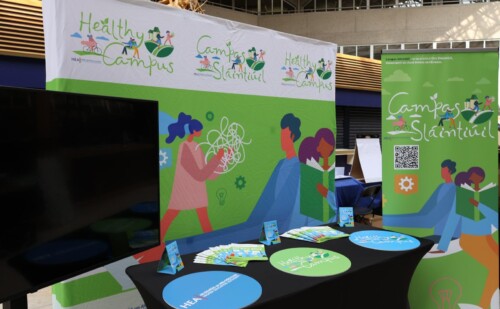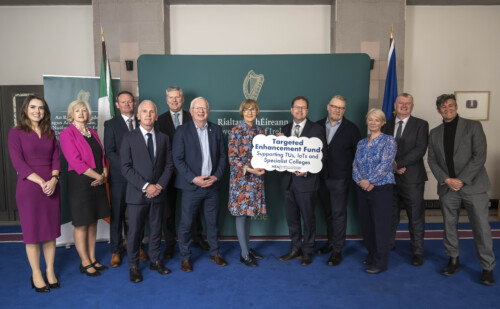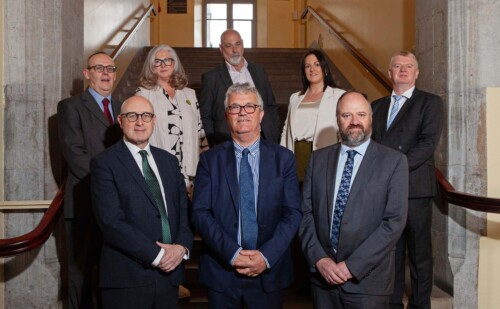Only colleges addressing gender inequality will get funding in new move by irish agencies
By Maura O'Shea
Posted: 12 December, 2016
Science Foundation Ireland, the Irish Research Council and the Health Research Board will require higher education institutions to have Athena SWAN gender equality accreditation in order to be eligible for research funding.
The Higher Education Authority (HEA) today welcomed the move by three of Ireland’s research funding agencies to make gender equality accreditation in higher education institutions a condition of funding by the end of 2019. In taking this step, the agencies are adopting a key recommendation of the National Review of Gender Equality in Higher Education Institutions, published earlier this year, which showed that significant gender inequality remains in higher education. The move will promote gender equality in researcher careers and the gender dimension in research content, which are also key requirements for winning European Horizon 2020 research funding.
Higher education institutions will be required to have secured the minimum Athena SWAN gender equality accreditation by end 2019 in order to be eligible to compete for research funding allocated by any of the three agencies. By end 2023, the institutions will be required to hold the intermediate (silver) level accreditation to be eligible for competitive research funding. The combined annual budget for research for the three agencies is c.€230m.
Welcoming the move, the interim CEO of the HEA, Dr. Anne Looney remarked:
‘This is a very important step along the path to gender equality in Ireland’s higher education institutions. Strong inter-agency coordination and collaboration is the key to achieve the vision for gender equality as set out in the expert review. This joint approach agreed by SFI, the IRC and HRB, who together allocate the bulk of competitive research funding in Ireland, is an example of just that. It sends a clear message; research funding will only be awarded where gender equality is taken seriously.’
Speaking on behalf of Science Foundation Ireland, Prof. Mark Ferguson, Director General, and Chief Scientific Adviser to the Government of Ireland stated:
‘The vision behind Ireland’s strategy for research & development, science and technology – Innovation 2020 – is for Ireland to become a global innovation leader. It is well recognised that gender diversity is a key element of successful research and innovation. Science Foundation Ireland is dedicated to developing a world-leading open research culture in Ireland, and to ensuring that outstanding talent is recognised. We need to ensure that researchers are supported throughout their careers, particularly during critical junctions. Supporting the implementation of Athena Swan accreditation across our research system sends a clear signal that we want a research environment that champions diversity and equality.’
The Director of the Irish Research Council, Dr. Eucharia Meehan remarked that:
‘The Council has had a gender strategy in place since 2013 and has played a leading role on this agenda internationally through the European-funded GENDER-NET project. This move is consistent with the Council’s strong track record in this area and places the Irish research system overall strongly in the realm of best practice on gender equality.’
Dr. Graham Love, CEO of the Health Research Board said:
‘The HRB is committed to mainstreaming gender equality in our funding programmes and practices. Our gender policy reflects the need for equitable and fair treatment of both genders in assessing applications for funding, and also in ensuring that the design and conduct of research considers gender influences and issues. We welcome the recommendations from the HEA Expert Group and look forward to working in partnership with the HEA and other Irish Funding Agencies on the national implementation plan.
The Athena SWAN Charter is an internationally recognised ‘quality mark’ for gender equality administered by Equality Challenge Unit in the UK. Accreditation indicates that a HEI has demonstrated its commitment and work in advancing gender equality across all academic disciplines. Accreditation is made at bronze, silver and gold levels. Currently, three universities in Ireland have Bronze institutional awards: University College Cork, the University of Limerick and Trinity College Dublin.’
The positive benefit of this move was highlighted by David Ruebain, Chief Executive of the Equality Challenge Unit:
‘It is of course up to research funders to decide the terms of their funding, but experience of linking progress in equality with funding has demonstrated that this move can bring benefits to the research community. It can drive forward gender equality and allow the sharing of best practice and collaboration between Ireland, the UK and Australia, where Athena SWAN currently operates. On the international stage, the profile of Irish research will I’m sure be raised especially within the European Research Area, where gender equality is a key pillar to fostering excellence in scientific achievement.’
Contact:
Higher Education Authority – Dr. Gemma Irvine; girvine@hea.ie, 01 2317100
Science Foundation Ireland – Alva O’Cleirigh; alva.ocleirigh@sfi.ie, 01 607 3249
Irish Research Council – Dr. Eucharia Meehan; emeehan@research.ie, 01 2315000
Health Research Board – Gillian Markey; gmarkey@hrb.ie, 01-2345000
Notes to Editors: Athena SWAN
ECU’s Athena SWAN Charter was established in 2005 to encourage and recognise commitment to advancing the careers of women in science, technology, engineering, maths and medicine, employed in higher education and research. In 2015 the charter was expanded to recognise work undertaken in arts, humanities, social sciences, business and law, and in professional and support roles, and for trans staff and students. The charter now recognises work undertaken to address gender equality more broadly, including in relation to representation, progression of students into academia, journey through career milestones and the working environment for all staff.
Further information on Athena SWAN in Ireland is available here.
Higher Education Institutions (HEIs)
The need for accreditation will apply to the seven HEA core-grant funded HEIs, as well as the Royal College of Surgeons in Ireland and the institutes of technology (IOTs).
Key Statistics / Findings from the National Review of Gender Equality in Higher Education Institutions
Presidents of Higher Education Institutions:
- Since the establishment of the first Irish university 424 years ago, there has never been a female president.
- Currently, 4 of the 14 (29%) Institutes of Technology have a female President. Of the 54 IoT Presidents to date, only 8 have been women (15%).
Gender Balance on Governing Authority / Body of Higher Education Institutions
- As of September 2015, 5 out of 7 seven universities had 40% or more women on their governing authority / body.
- Only 8 of the 14 Institutes of Technology had 40% or more women on their governing authority / body.
Executive Management Teams
- In December 2015, only 2 of the 7 universities had 40% or more women on their executive management team.
- Only 3 out of 14 Institutes of Technology had 40% or more women on their executive management team.
- Two Institutes of Technology had no women at all on their executive management team.
Career Progression
- The gap between female and male representation increases at each stage of the academic career ladder. In 2013-2015, 50% of the lecturer staff in Irish universities were women, but only 19% of professors were women.
Perceptions of Gender Inequality in Higher Education Institutions
- 4,835 respondents completed the national online survey conducted for the purposes of the review. 89.7% of these (4,337) indicated that they were, or had been, affiliated to a higher education institution. The majority of respondents thought that there was gender inequality in Irish higher education (56%). There was a difference between women and men in the perception of gender inequality in Irish higher education: 64% of women indicated gender inequality was present, compared to 38% of men.


